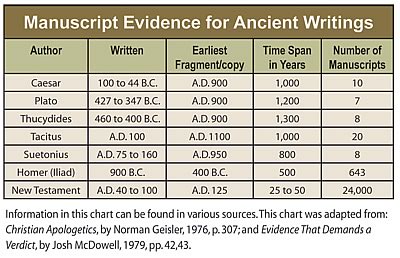 Occasionally, people will suggest that the New Testament is full of stories that developed over time. In other words, it’s myth. This theory supposedly offers a solution to the historical person of Jesus as well as the claim that he was God. The famous saying, coined by C.S. Lewis, is that Jesus must be either a liar, a lunatic or Lord, but with the myth conjecture, none of those have to be true.
Occasionally, people will suggest that the New Testament is full of stories that developed over time. In other words, it’s myth. This theory supposedly offers a solution to the historical person of Jesus as well as the claim that he was God. The famous saying, coined by C.S. Lewis, is that Jesus must be either a liar, a lunatic or Lord, but with the myth conjecture, none of those have to be true.
Instead, it is suggested that Jesus was just a historical man who had stories about his actions grow, and grow and grow until people believed he was a god.
So, is the New Testament myth? How should the Christian respond to this objection? It really all boils down to when the New Testament was written, and we have really good evidence for early dating. This is important because in order for myth to develop there needs to be a lot of time between the recorded events and the writings, and that just isn’t the case for the New Testament. Some of Paul’s letters are the earliest record beginning around 25 years after Jesus’ death and resurrection. The dating of the Gospels begins around 35 years after the event. Now, that may seem like a fairly long time by modern standards, but by ancient standards it’s almost unheard of. Just compare the New Testament to these other ancient sources:

As you can see from the chart, the New Testament has earlier (and more) manuscripts than some of the most respected writings from antiquity. No one questions the Iliad. It’s read in every university around the country as a landmark piece. Tacitus is considered the chief Roman historian of his day, and yet, the biographies of Jesus’ life are repeatedly called into question. Interesting isn’t it?
We also infer the early nature of the New Testament in other ways too[1]. For instance, the early church father Ignatius quoted twenty-five out of the twenty-seven of the New Testament books by 110 AD. Obviously, for them to be quoted they had to first be written. Additionally, there is no New Testament writer who records the destruction of the temple which occurred in 70AD. The temple was a key component in the setting of the New Testament world. Also imperative to the early church was the leadership of Peter, Paul and James (the brother of Jesus), and yet their deaths aren’t mentioned anywhere either. Why wouldn’t one New Testament writer mention the destruction of the temple or these key deaths? It’s likely that the record is true, and the whole New Testament was finished before these key events.
Simply put, the New Testament was written so closely to the actual events that there just isn’t enough time for myth to develop. The New Testament then, is historically reliable and trustworthy.
Consider then the words of this old saying[2]:
The Bible is the mind of God and the way of salvation. Its doctrines are holy, its precepts are binding and its histories are true. Read it to be wise, believe it to be safe, practice it to be holy. Christ is its grand subject, our good its design, and the glory of God its end. It should fill the memory, rule the heart, and guide the feet. Read it slowly, frequently, prayerfully. Follow its precepts and it will lead you to Calvary, to the empty tomb, to a resurrected life in Christ; yes, to glory itself, for eternity.
_________________________________________________________________________________________
[1] The facts represented in this post regarding the dating of the New Testament regarding early dating are from J. Warner Wallace at Coldcasechristianity.com and Frank Turek’s book, “I Don’t Have Enough Faith to be an Atheist.”
[2] I believe some version of this originated with the ministry of the Gideons.

I found it very interesting that John Robinson, the English cleric who wrote ‘Honest to God’ in the 1960s – a very unorthodox view of Christianity – studied the question of when the books of the New Testament was written and delved into the question in an exhaustive and scholarly manner, using many associated texts, and became convinced that the whole of the New Testament was written by AD 90 at least and that the three synoptic gospels were written very close to the time of Jesus’ life. He was not disposed theologically to accept the New Testament as historically true, but was compelled by the evidence to this view. His book is entitle Redating the New Testament, published in 1959. By redating he meant abandoning the popular scholarly idea that the NT was written in the second century AD or later.